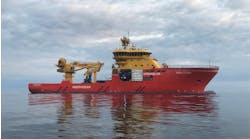Offshore staff
LONDON – The North Sea Transition Authority (NSTA) has awarded 20 carbon storage licenses to 12 companies at offshore UK sites, including some near Aberdeen, Teesside, Lincolnshire and Liverpool.
Applications for Britain’s first carbon storage licensing round closed last September. In total the offered areas cover about 12,000 sq km.
The NSTA claims that first CO2 injection could follow within six years. The government’s goal is to store up to 30 MM metric tons per year of CO2 beneath UK waters by 2030.
In the budget this March, UK Chancellor Jeremy Hunt announced that the government would allocate up to £20 billion ($24.83 billion) to support CCUS, starting with projects on the East Coast, Merseyside and North Wales.
Up to 100 CO2 stores could be needed for the UK to meet its net zero aims by 2050.
According to the NSTA, the licenses feature a range of geological store types and were chosen based on geology, proximity to existing infrastructure (as at Bacton off the coast of Norfolk) and links to industrial clusters as potential users.
Also considered was the need to share offshore space with other seabed users such as offshore wind developers and petroleum operation.
Once a CCS license is issued, licensees must also obtain a seabed lease from The Crown Estate or Crown Estate Scotland before taking their project forward. And further consents and approvals will be needed ahead of any appraisal activity on carbon storage licenses.
OEUK CEO David Whitehouse said, “We will need 100 such sites or more, and the Track 1 and 2 clusters to be accelerated, if we are to reach net zero—so we mustn’t stop here.”
Among the awarded licenses, EnQuest has successfully secured the offer of carbon storage licenses as part of the first round of UK carbon sequestration licenses issued by the NSTA.
The license offers are within application areas known as Northern North Sea 1 and Northern North Sea 2. These are some 99 miles northeast of Shetland and include fields operated by EnQuest, the Magnus and Thistle fields, as well as the non-operated Tern and Eider fields. These sites are large, well characterized deep storage formations connected by significant existing infrastructure to the Sullom Voe Terminal (SVT) in Shetland, the company said.
EnQuest plans to have CO2 shipped to SVT in liquid form and then utilize the existing jetties at the terminal before being transported via the existing east of Shetland pipeline for injection and permanent storage offshore. The flexibility afforded by a shipped solution for carbon storage is expected to enable a service to be provided to isolated emitter clusters in the UK, Europe and further afield who may not otherwise be able to access storage infrastructure.
05.18.2023




